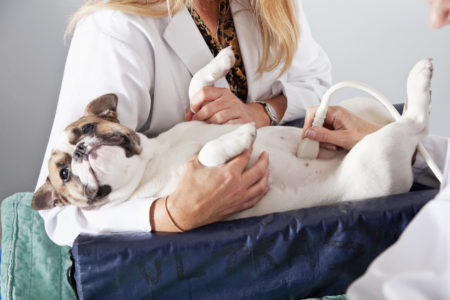Avoid Pet Surgery This Winter

The holidays are a joyous and warm time, that is until your pet gets into something he or she shouldn’t and needs to see a veterinarian. Some injuries and accidental ingestions may be a minor issue that a little bandaging or fluids can remedy, but some can be more severe and require emergency surgery. One of our surgeons, Dr. Dietrich Franczuszki has some tips on avoiding pet surgery this winter.
Winter Wonderland Mishaps
Many pets get very excited by the snow, especially if they rarely see or have never seen it. The squishy, white fluff coating the world can be incredibly enticing until dogs lose their balance on ice or overexert themselves with rough play. This can lead to injuries like torn cruciate ligaments or dislocated kneecaps, all of which might require surgery. Consider getting special snow booties for your pet that help them maintain their balance and if your pet gets excitable in the snow, try to keep him or her in a smaller enclosed area or on a leash when outside to avoid too much running and jumping.
Osteoarthritis can also flare up more in cold weather, resulting in joint swelling and pain for your pet. If your pet has a history of osteoarthritis, do what you can to keep him or her warm inside as much as possible and consider buying doggie outerwear for short trips outside. Warm compresses to the affected joints may also ease the pain.
Biting Off More Than They Can Chew
Certain holiday and winter-related objects can cause internal obstruction or even toxicity if ingested. Antifreeze is extremely toxic for pets, so much so that for cats, even just a lick at the bottom of someone’s shoe after stepping in antifreeze can be fatal. Keep this product far away from pets and wash hands well after use.
Holiday decorations like balloons, tinsel, and ornaments, as well as small toys, wrapping paper, and batteries, can be an issue if ingested. Even less considered holiday items like kebab skewers, toothpicks, sewing and knitting needles (anyone embroidering a stocking?), etc. can cause piercing or blockage of essential organs.
Many of these items require minimally invasive or invasive surgical removal as they can cause an obstruction that may not resolve on its own, and in some cases, like batteries, toxic leakage. It’s also very important to remember that if you see something hanging out of your pet’s mouth or behind (such as tinsel or string), DO NOT attempt to pull it out. This string might be wrapped around something internally that could cause extreme damage if pulled. If you see this, bring your pet to a veterinarian right away for professional removal.
At VRC, we offer both minimally invasive and traditional surgical solutions for your pet, as well as a variety of on-site diagnostic capabilities like X-ray, ultrasound, and CT should your pet ingest something they shouldn’t. We are open 24/7, 365 days a year for emergency care and also offer 24/7 emergency surgery if needed.






 Email
Email





